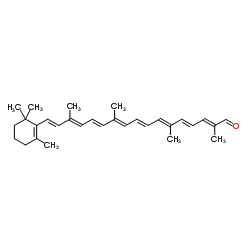Beta-carotene and apocarotenals promote retinoid signaling in BEAS-2B human bronchioepithelial cells.
Emmanuelle Kuntz, Ulrich Hoeller, Brad Greatrix, Christopher Lankin, Nicole Seifert, Samir Acharya, Georges Riss, Petra Buchwald-Hunziker, Willi Hunziker, Regina Goralczyk, Karin Wertz
文献索引:Arch. Biochem. Biophys. 455(1) , 48-60, (2006)
全文:HTML全文
摘要
High dose beta-carotene supplementation of smokers was associated with increased lung cancer risk in two intervention trials. It was proposed that generation of apocarotenals in smoke-exposed lungs impaired retinoic acid (RA) signaling, leading to squamous metaplasia and cell proliferation. To test this, we compared RA target gene regulation by retinoids, apocarotenals or beta-carotene by transcriptomics in BEAS-2B cells cultured to promote squamous differentiation. Retinoids, beta-carotene as well as apocarotenals induced known RA target genes. Retinoids upregulated involucrin, indicating that retinoids did not rescue BEAS-2B cells from squamous differentiation. Muc5AC, a marker for mucous differentiation, was transiently induced. beta-Carotene and apocarotenals less strongly induced involucrin and did not induce muc5AC. In summary, apocarotenals or beta-carotene upregulated RA target genes suggesting promotion, not inhibition, of RA signaling in BEAS-2B cells. Furthermore, apocarotenals and beta-carotene regulated gene expression independently of RA signaling. Squamous differentiation is not unequivocally linked to RA deficiency in BEAS-2B cells.
相关化合物
| 结构式 | 名称/CAS号 | 分子式 | 全部文献 |
|---|---|---|---|
 |
全反式-β-阿林胡萝卜醛
CAS:1107-26-2 |
C30H40O |
|
The formation, occurrence, and function of β-apocarotenoids:...
2012-11-01 [Am. J. Clin. Nutr. 96(5) , 1189S-92S, (2012)] |
|
Structural basis of carotenoid cleavage: from bacteria to ma...
2013-11-15 [Arch. Biochem. Biophys. 539(2) , 203-13, (2013)] |
|
beta-Apo-8'-carotenal, but not beta-carotene, is a strong in...
1996-09-01 [Xenobiotica 26(9) , 909-19, (1996)] |
|
Retinoids and related compounds. XI. Synthesis and stereoche...
1988-09-01 [Chem. Pharm. Bull. 36(9) , 3328-40, (1988)] |
|
The ORF slr0091 of Synechocystis sp. PCC6803 encodes a high-...
2013-08-01 [FEBS J. 280(15) , 3685-96, (2013)] |